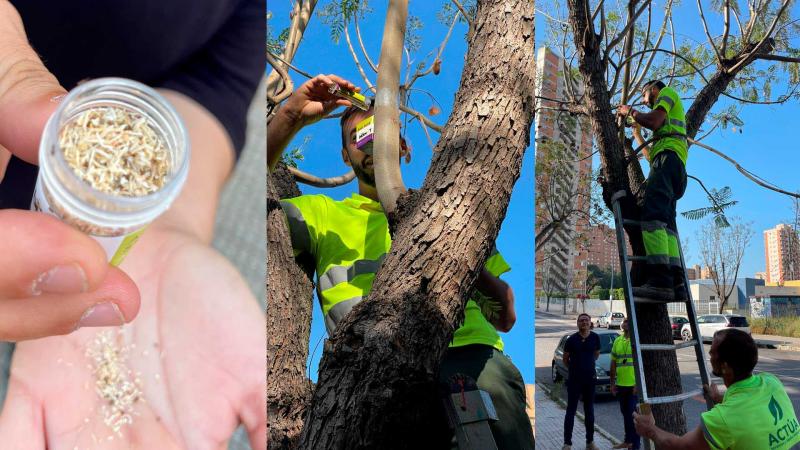For the second year, the population of insects that kill the aphid is reinforced, thus preventing it from producing the molasses that dirty streets and vehicles
Benidorm opts for biological control to combat the jacaranda aphid

With this environmental tool, the management of parks and gardens is free of chemicals and phytosanitary products
After the good results obtained last year, Benidorm has once again resorted to biological control to combat the aphid plague that affects the jacarandas, a common tree species in the streets of the city. The Councilor for Parks and Gardens, José Ramón González de Zárate, explained that "this tool is respectful of the ecosystem and compatible with environmental safety and human health, and allows us to manage our green areas and our trees free of chemicals and phytosanitary products.
De Zarate has detailed that "this tool consists of reinforcing the population of insects that kill the aphid to prevent it from attacking the jacarandas and producing molasses, which is that sugary and sticky substance that, when falling from the tree, dirty the pavement of the streets and the vehicles that park underneath.” In this way, he has stressed, "we achieve a double objective: to keep these trees free of pests and that our streets are cleaner and much more comfortable for pedestrian traffic."
Throughout the morning, personnel from the concessionaire company Actúa and Fitorser Agro have been introducing the insects that combat aphids in the jacarandas in the La Cala area. In this intervention, which in the coming days will be extended to the rest of the city, collaboration has also been made with the insect-producing company Biobest Group.
The biologist, entomologist and head of the Fitoser Agro R&D department, Cristina Verdú, explained that this biological control technique is based on the conservation of beneficial insects (auxiliary fauna) that feed on harmful insects (pests). that affect our plants, without the need for the intervention of a chemical product and allowing the ecological balance between their populations.
In the specific case of jacarandas, it consists of “the release of parasitoid wasps that introduce their eggs inside the aphids, developing in such a way that the aphid dies and they are born again”.
Verdú has stressed that "we do not introduce any insect that is not part of the ecosystem, but we reinforce its population".
The Councilor for Parks and Gardens has pointed out that "at the moment we are focusing on the biological treatment against aphids in jacarandas, but we are going to use this environmental tool against any other pest that we can detect, using the corresponding insect in each case" . De Zárate stressed that "we want the management of our green areas to be the most respectful of the environment and, therefore, we will continue to use tools like these, sustainable alternatives to chemical and phytosanitary products".




